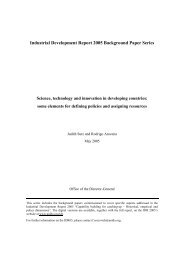Manual on the Development of Cleaner Production Policies ... - Unido
Manual on the Development of Cleaner Production Policies ... - Unido
Manual on the Development of Cleaner Production Policies ... - Unido
Create successful ePaper yourself
Turn your PDF publications into a flip-book with our unique Google optimized e-Paper software.
DEVELOPMENT OF CP POLICY<br />
MODULE 5: POLICY TOOLS AND INSTRUMENTS<br />
Special-purpose funds or s<strong>of</strong>t loans are <strong>of</strong>ten provided through financial intermediaries in developing<br />
countries. Examples <strong>of</strong> such facilities include World Bank and Kreditanstalt für Wiederaufbau (KfW)<br />
credit lines for CP and polluti<strong>on</strong> preventi<strong>on</strong> financing in China, India and some countries in Latin<br />
America. The Asian <strong>Development</strong> Bank is in <strong>the</strong> process <strong>of</strong> planning a special SME fund <strong>on</strong> CP for<br />
selected countries in <strong>the</strong> regi<strong>on</strong>.<br />
SLIDE: Possible new areas for CPC involvement<br />
• Multilateral envir<strong>on</strong>mental agreements;<br />
• Green investment funds and innovative financing;<br />
• Envir<strong>on</strong>mentally sound technology transfer programmes;<br />
• Eco-labelling and certificati<strong>on</strong>s;<br />
• Envir<strong>on</strong>mental Management Accounting;<br />
• Occupati<strong>on</strong>al health and safety.<br />
<br />
This slide signals some new areas—in additi<strong>on</strong> to <strong>the</strong> <strong>on</strong>es already presented<br />
earlier in <strong>the</strong> module—where CP centres can expect to play a greater role in<br />
<strong>the</strong> near future.<br />
Background<br />
An overview <strong>of</strong> recent policy trends suggests that, in <strong>the</strong> near future, CP Centres could become<br />
increasingly involved in new, n<strong>on</strong>-traditi<strong>on</strong>al areas, including:<br />
1. Implementati<strong>on</strong> <strong>of</strong> internati<strong>on</strong>al envir<strong>on</strong>mental c<strong>on</strong>venti<strong>on</strong>s<br />
CP Centres are already involved in projects relating to some multilateral agreements such as <strong>the</strong><br />
Basel C<strong>on</strong>venti<strong>on</strong> <strong>on</strong> hazardous waste. In <strong>the</strong> near future, CP centres may also be involved with<br />
<strong>the</strong> greenhouse gas abatement <strong>of</strong> <strong>the</strong> Kyoto Protocol or <strong>the</strong> reducti<strong>on</strong> <strong>of</strong> persistent organic<br />
pollutants addressed in <strong>the</strong> Stockholm C<strong>on</strong>venti<strong>on</strong>;<br />
2. Green investment funds and innovative financing schemes for CP<br />
Financial engineering <strong>of</strong> CP projects is <strong>of</strong>ten requested by clients, and development banks and<br />
internati<strong>on</strong>al financing instituti<strong>on</strong>s are similarly already showing interest. Some green investment<br />
funds have emerged, where shareholders are investing in envir<strong>on</strong>mentally beneficial projects.<br />
The Swiss Bank Corporati<strong>on</strong>, for instance, <strong>of</strong>fers investments in ecological leaders or innovators<br />
who are interested in implementing CP opportunities;<br />
3. Technology transfer projects<br />
Many such projects were fashi<strong>on</strong>able at <strong>the</strong> beginning <strong>of</strong> <strong>the</strong> nineties. Experience showed,<br />
however, that technology transfer without <strong>the</strong> underlying policy work does not bring sustainable<br />
benefits. The current definiti<strong>on</strong> <strong>of</strong> “envir<strong>on</strong>mentally sound technologies” includes polluti<strong>on</strong><br />
c<strong>on</strong>trol equipment—a new product for <strong>the</strong> Centres. For some regi<strong>on</strong>s, <strong>the</strong> clustering <strong>of</strong> several<br />
small countries to create a more attractive market for technology transfer may be an interesting<br />
opti<strong>on</strong>;<br />
4. Eco-labelling and CP certificati<strong>on</strong>s<br />
Following <strong>the</strong> success <strong>of</strong> ISO 14001, and less<strong>on</strong>s learned from <strong>the</strong> implementati<strong>on</strong> <strong>of</strong> some ecolabel<br />
and nati<strong>on</strong>al envir<strong>on</strong>mental certificati<strong>on</strong> schemes, it is likely that eco-labelling will so<strong>on</strong> be<br />
back <strong>on</strong> <strong>the</strong> agenda in some form. The publicati<strong>on</strong> <strong>of</strong> <strong>the</strong> ISO 14020-24 standards <strong>on</strong> ecolabelling<br />
will help structure <strong>the</strong> process;<br />
PAGE 133
















